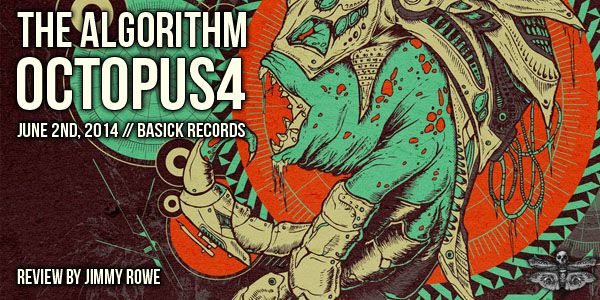
Remi Gallego’s The Algorithm is likely an anomaly in the listening habits of thousands of listeners; the France-based electronic act is marketed almost exclusively to those interested in tech metal and djent. Indeed, The Algorithm is overtly influenced by and born out of the djent movement and surrounding online scene — going as far as recruiting Monuments drummer Mike Malyan for live shows — but Gallego has since blossomed into a legitimate force in electronic music, bridging the gap and offering crossover appeal. The Algorithm as we know it on the sophomore album OCTOPUS4 is a far cry from the avant-garde djent style that the early demos had implied.
OCTOPUS4 is a stylistic evolution for The Algorithm, taking the act further into progressive and experimental electronics and away from metal, just as the debut full-length album Polymorphic Code left off. The heavy drum and bass grooves and angular arps may mimmick the aggressive attack of technical metal, and Gallego even manages to pick up a guitar during key opportune moments, but OCTUPUS4 is first and foremost an electronic record. Don’t be fooled by the inaccurate “math metal” and “progressive metal” Last.FM tags or the crowd The Algorithm associates with; it’s all a clever ruse to expand the sonic palette of a genre that is nearly defined by a single guitar tone.
Of course, there are exceptions; Humanity’s Last Breath‘s Markus Hultqvist contributes brief vocals to ‘synthesiz3r’ and the title track offers plenty of blast beats. But even as OCTOPUS4 takes The Algorithm further away from metal while still nodding at its origins, it manages to be Gallego’s best work to date. While the songs on Polymorphic Code were very interesting, OCTUPUS4 feels much more substantial, and more importantly, outrageously catchy. Gallego has grown as a songwriter and producer, and has successfully avoided our one major criticism of Polymorphic Code. A formula was seemingly brewing, but OCTOPUS4 side-steps this completely in favor of a diverse listening experience that never rests too heavily on its laurels.
The Algorithm once again acts as a catch-all for various electronic subgenres and jumps around enough to keep an air of puzzling uncertainty. A foundation of IDM, progressive house, and 8-bit chiptunes is elaborated upon with dubstep wobs and metalcore breakdowns in a way that isn’t at all campy or cheesy, unless where otherwise intended. For example, ‘Discovery’ takes a page out of the Perturbator playbook by peddling sleazy 80’s retrofuturism, and ‘will_smith‘ is an irreverent collage of ideas, yet is one of the album’s best tracks.
It’s far too easy for The Algorithm — who once Rickrolled and entire audience instead of following through on a building climax during Euroblast — to fall into the role as a tongue-in-cheek and playful act, but OCTOPUS4 touches on somber soundscapes and “serious” pieces. ‘void‘ is true to its title as an ambient piece, and the proceeding track ‘loading‘ cycles through some haunting minor chord progressions. The ADD-addled wackiness The Algorithm has become known for is well balanced with genuinely fascinating music, and Gallego doesn’t stick to the role of court jester for long.
The Algorithm’s holistic and all-inclusive approach to music and songwriting is something to be treasured in a world where arbitrary lines are drawn in the sand, dictating where one can and cannot go in the course of a song. Nothing is off bounds in OCTOPUS4, yet the reigns are tightened enough to make for a cohesive album with at atmosphere adeptly built to allow for wild leaps in tone. No matter where OCTOPUS4 winds up, it always feels patently The Algorithm. Instead of painting himself into a corner, OCTOPUS4 broadens the horizons, and where Gallego goes from here is unknown. The possibilities however, are endless.
The Algorithm – OCTOPUS4 gets…

4/5
– JR